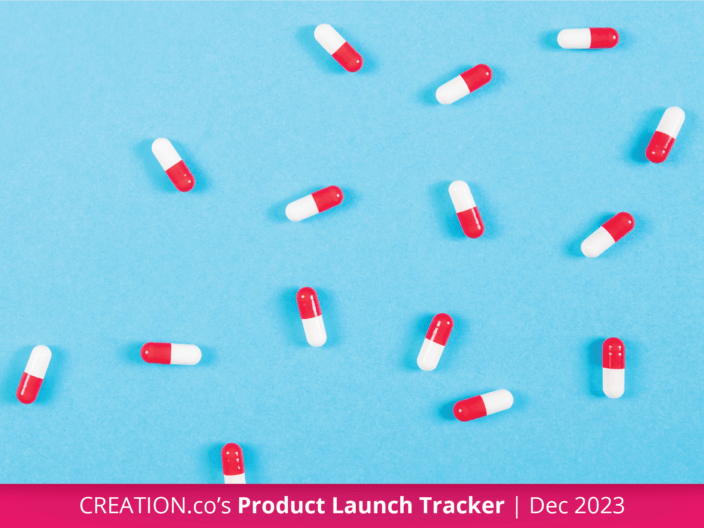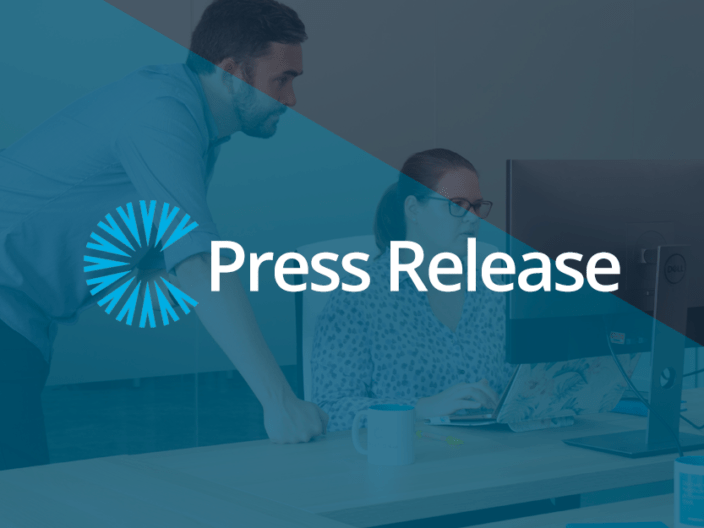A year has passed since the coronavirus pandemic changed our lives. We changed from working, shopping and meeting with friends in person to doing everything online. We have become digital beings, and while we have been evolving to become more digitally savvy, enterprises have also progressed in the digital world by learning new ways of understanding and engaging with their customers.
One of the many industries that is currently evolving in the digital world is the pharmaceutical industry as they innovate to understand and engage with healthcare professionals (HCPs) online. At CREATION.co we have been tracking the conversations of HCPs for more than 20 years and found that during the coronavirus pandemic the voice of HCPs online greatly increased, creating a unique opportunity for pharmaceutical companies to be close to the voice and needs of their customers.
A strategy that has proven successful over time to understand and engage with HCPs online is tracking their conversations during medical congress meetings. We have found that these events reveal insightful information regarding what HCPs think about a company, product, clinical trial data, or a need in a therapy area, which can guide pharmaceutical companies to strategise and engage with HCPs more effectively.
We chose to analyse the HCP online conversation around the delayed 2020 World Conference on Lung Cancer (WCLC) that occurred from the 28th to the 31st of January, 2021. We analysed 3,824 Twitter posts from 493 HCPs globally, between January 15, 2021 to February 15, 2021, and we found three key lessons that pharmaceutical companies can use to engage with such physicians at medical congress meetings:
- Understand and meet a specific need.
- Identify and partner with Digital Opinion Leaders.
- Learn from what your competitors are doing.
1. Understand and meet a specific need
The 2020 WCLC congress consisted of a variety of different topics within the lung cancer therapy area, ranging from sharing trial data to discussing patient needs. After analysing the overall conversation, we found that novel treatments for NSCLC (Non-small celular lung cancer) with an EGFR mutation (Epidermal growth factor receptor) was a topic of interest for HCPs, comprising 7% of the total WCLC Twitter mentions.
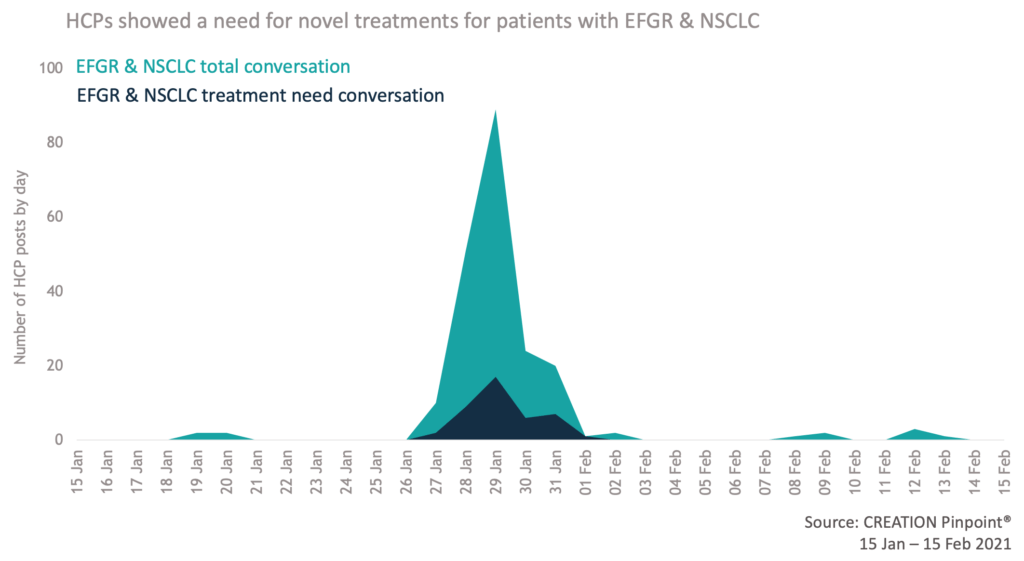
Within that conversation, HCPs discussed a phase 2 trial of nivolumab vs. nivolumab and ipilimumab showing that the research stopped due to major harm in a patient. Due to this situation, they communicated the need for better treatments for EFGR + NSCLC patients.
Study stopped early due to a lack of activity for both arms. One pt had a response in each arm. We need to get a better understanding of how to help patients with EGFR+ NSCLC respond to immunotherapy. Just giving them the same treatments does not seem to work #WCLC20 #LCSM pic.twitter.com/BdDp1qHVdN
— Joshua Bauml, MD (@Jbauml) January 29, 2021
#WCLC20 Results from randomized phase II of nivo vs nivo/ipi in #EGFR mutant NSCLC. Unfortunately, study stopped for futility (n=31) but glad to see results presented. #LCSM @IASLC pic.twitter.com/VrS92AHY1Y
— Stephen V Liu, MD (@StephenVLiu) January 29, 2021
When a situation like this arises, pharmaceutical companies can take the initiative to engage with HCPs in order to understand and meet the need. One strategy is to host a Twitter chat using a unique hashtag such as #EFGRNSCLCtreatment, to encourage HCPs to discuss the topic more in-depth and allow for new information to be shared. In this way pharmaceutical companies will have a better idea of what the need is, how they can approach it and could start a conversation on how to help support EFGR + NSCLC patients better.
2. Identify and partner with Digital Opinion Leaders
More so than at any other time, when a congress takes place, HCPs share and post information on their social media channels by discussing data presented at the event. This situation allows us to analyse which HCPs are leading and influencing the conversation in a specific area.
For example, from the EFGR+NSCLC mentions online, we can pinpoint which HCPs are guiding the conversation and influencing their peers. While there are a multitude of metrics we can use to identify a Digital Opinion Leader (DOL), in this case, based on HCP number of posts and number of HCP followers, we found that HCPs Joshua Bauml, Gilberto Lopes, and Stephen Liu posted the most and had the biggest reach in this area, making them key HCPs that pharmaceutical companies could partner with. In fact, in the EFGR + NSCLC discussion, Joshua Bauml and Stephen Liu were key communicators in raising awareness of the need for better treatments for patients.
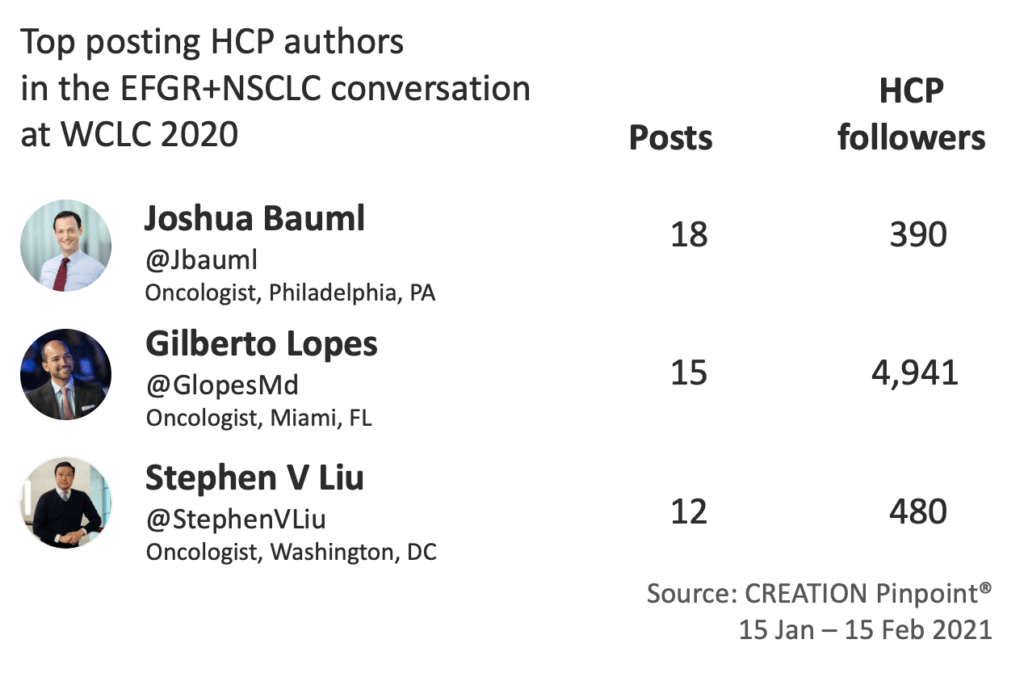
While pharmaceutical companies can engage with these DOLs in various ways, there are three strategies that have proven successful over time. Pharmaceutical companies can:
- Run a training program to educate DOLs in a topic in which they show a lack of understanding, so that they can share the information learned with their followers.
- Host an online event for the selected DOLs to discuss a therapy area, which will allow the reach of such an event to increase.
- Develop an online video with DOLs in order to share on their social media channels, while also encouraging DOLs to share on their channels to reach their followers.
These strategies will help the pharmaceutical companies to develop a more meaningful relationship with HCPs and in that way be closer to what they say and what they need and just a few of the ways we had advised clients to engage with DOLs.
3. Learn from what your competitors are doing
Looking at all the HCP conversations during the WCLC congress, seven pharmaceutical companies were mentioned by HCPs, from which Pfizer, Amgen, and AstraZeneca were the top three most mentioned. Pharmaceutical companies can understand how HCPs are engaging with competitors and thus innovate their approach to engage with HCPs.
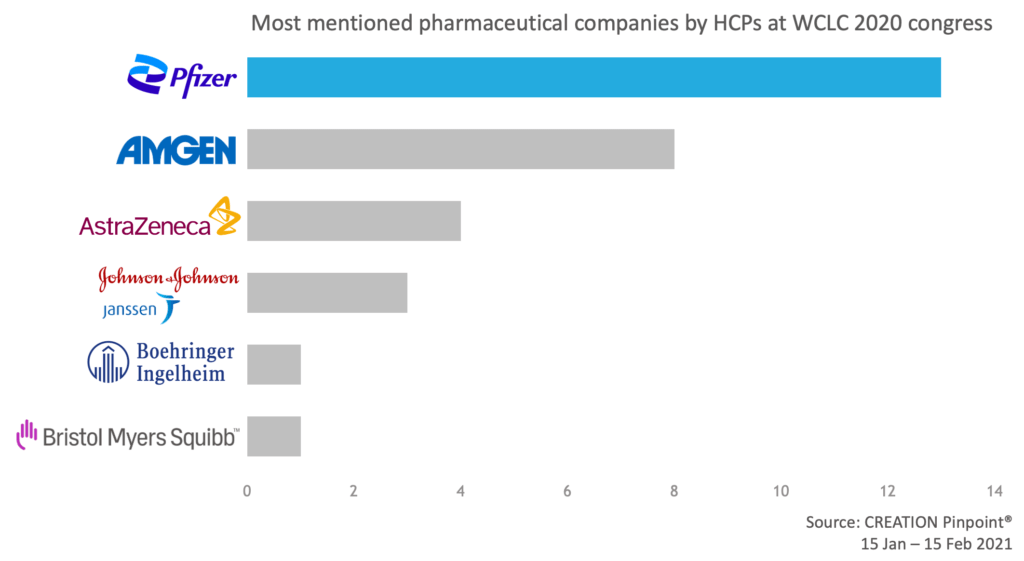
When looking at how Pfizer, Amgen and AstraZeneca engaged with HCPs during WCLC 2020, we can see two HCP engagement opportunities. The first opportunity is to fund and support a research study, as HCPs are likely to share their involvement online with their followers. One example at WCLC 2020 was Oncologist Abdul-Rahman Jazieh, who shared about a study he was a part of alongside AstraZeneca, which received one retweet and 10 likes from his HCP peers.
It was my pleasure to present #WCLC20 the #realworlddata of the Kindle #study of 3151 patients with stage 3 #NSCLC describing #EGFR testing, treatment and outcome from 100 centers in 19. Thanks to all collaborators and our patients #wclc2020 @OncLive @OncoAlert @AstraZenecaUS
— Abdul-Rahman Jazieh, MD, MPH (@arjazieh) January 29, 2021
CROWN study for AE profile matches my own "self" real world data. Every toxicity on the graph I personally experienced. Lorlatinib is an amazing life saving drug, but those AE's effect QoL. A great #pallative care team can help. @pfizer @IASLC @ALKLungCancer #LCSM #WCLC20 pic.twitter.com/W5inkYotQS
— Erika Hlavacek (@ErikaHlavacek) January 29, 2021
The second opportunity to engage with HCPs we saw is to create posts that encourage physicians to follow the latest research that the pharmaceutical companies have been involved in, while also putting the hashtag of the congress #WCLC20. In this way, HCPs have the opportunity to learn how companies are supporting the therapy area and thus show interest in the brand. Amgen’s post about their oral presentation on their ‘investigational small molecule inhibitor’ at WCLC 2020 was engaged with by the HCP community with two retweets and three likes.
Don’t miss @Amgen’s oral presentation at #WCLC20 on our investigational small molecule inhibitor of #KRASG12C in patients with advanced non-small-cell lung cancer (NSCLC).
— Amgen Oncology (@AmgenOncology) January 29, 2021
At Pfizer Oncology, we are dedicated to advancing care in #LungCancer. We will be highlighting our latest research on January 28-31 at #WCLC20. Thanks to all patients and HCPs for participating in important #CancerResearch. https://t.co/rz65waF4Xe pic.twitter.com/LOumsbHREK
— Pfizer Oncology Medical (@PfizerOncMed) January 28, 2021
At CREATION.co we specialise in supporting pharmaceutical companies with HCP insights and strategy from HCP social media market research. Our aim is to help brand teams understand the conversations that HCPs are having online, as well as identifying the DOLs that are influencing the online conversations. If you are interested in finding our more don’t hesitate to get in touch, we’d love to help.
Methodology:
- The 2020 WCLC medical congress meeting occurred from 28 to 31 January 2021.
- The date range for the analysis of data was 15 January 2021 to 15 February 2021 and consisted of 3,827 HCPs posts from 497 HCPs.


